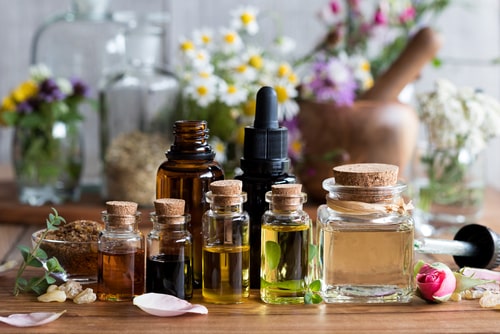As soon as I discovered I was pregnant, the morning sickness began. I immediately began searching the web and mom groups for a solution to ease my nausea without using any prescription medications. I noticed that many pregnant women were singing praises on using essential oils for nausea and to relieve many of the symptoms that came along during their pregnancy. My next thought was “are these essential oils safer than prescription meds?” Or are they even safe to use at all?
I started researching the best essential oils for pregnancy and discovered that a wide array of opinions are offered, with many differing in opinion. I did determine that specific essential oils have been advised NOT TO USE in pregnancy because they are unsafe for pregnant and lactating women. It doesn’t matter if they are diffused or topically applied because their chemical components contain constituents that can cross the placenta and are toxic to the growing baby. For example, camphor is a neurotoxin, is teratogenic and can cause deformities.
Essential Oils NOT to Use During Pregnancy
● Aniseed (Pimpinella anisum)
● Anise, Star (Illicium verum)
● Araucaria (Neocallitropsis pancheri)
● Artemisia (Artemisia vestita)
● Atractylis (Atractylylodes lancea )
● Lemon Basil (Ocimum x citriodorum) – Can be used at a low dilution, no more
than once a day
● Birch (Betula lenta)
● Black Seed (Nigella sativa)
● Buchu (Agathosma betulina, Agathosma crenulata)
● Calamint (Calamintha nepeta)
● Camphor (Cinnamomum camphora)
● Carrot Seed (Daucus carota)
● Cassia (Cinnamomum cassia)
● Chaste Tree (Vitex ugnus castus)
● Cinnamon Bark (Cinnamomum verum)
● Clary Sage (Salvia sclarea) – This should be avoided during pregnancy
because it can bring on contractions, but it has been used quite effectively in
the birthing room for just this purpose. It's safe for use during labor (under the
guidance of a doula or midwife) as well as postpartum.
● Cypress, blue (Callitris intratopica)
● Dill Seed (Anethum graveolens)
● Dill Seed, Indian (Anethus sowa)
● Eucalyptus, ALL (Eucalyptus camaldulensis, Eucalyptus globulus, Eucalyptus
maidenii, Eucalyptus plenissima, Eucalyptus kochii, Eucalyptus polybractea,
Eucalyptus radiata, Eucalyptus autraliana, Eucalyptus phellandra, Eucalyptus
smithi)
● Fennel, bitter and sweet (Foeniculum vulgare)
● Feverfew (Tanacetum parthenium)
● Frankincense (Boswellia papyrifer) – Can be used at a low dilution, no more
than once a day
● Genipi (Artemisia genepi)
● Hibawood (Thujopsis dolobratta)
● Ho Leaf (Cinnamomum camphora)
● Hyssop (Hyssopus officinalis)
● Lanyuna (Artemisia afra)
● Lavender, French/Spanish (Lavandula stoechas)
● Lemon Balm, Australian (Eucalyptus staigeriana) – Can be used at a low
dilution, no more than once a day
● Lemongrass (Cymbopogon flexuosus) – Avoid use during pregnancy, OK for
use while nursing
● May Chang (Litsea cubeba) – Avoid use during pregnancy, OK for use while
nursing
● Mugwort (Artemisia arborescens, Artemisia vulgaris)
● Myrrh (Commiphora myrrha)
● Myrtle (Backhousia anisata)
● Myrtle, Honey (Melaleuca teretifolia) – Avoid use during pregnancy, OK for
use while nursing
● Myrtle, Lemon (Backhousia citriodora) – Avoid use during pregnancy, OK for
use while nursing
● Nutmeg (Mysristica fragrans)
● Oregano (Origanum onites, Origanum smyrnaeum, Origanum vulgare, etc.)
● Parsley, Leaf/Seed (Petroslinum sativum)
● Pennyroyal (Mentha pulegium)
● Plectranthus (Plectranthus fruticosus)
● Rosemary (Rosmarinus officinalis)
● Rue (Ruta graveolens)
● Sage, Dalmatian (Salvia officinalis)
● Sage, Spanish (Salvia lavandulaefolia)
● Tansy (Tanacetum vulgare)
● Tea Tree, Lemon (Leptospermum petersonii) – Avoid use during pregnancy,
OK for use while nursing
● Thuja (Thuja occidentalis)
● Thyme, Lemon (Thymus x citriodorus) – Can be used at a low dilution, no
more than once a day
● Verbena, Lemon (Aloysia triphylla) – Can be used at a low dilution, no more
than once a day
● Western Red Cedar (Thuja plicata)
● Wintergreen (Gaultheria procumbens)
● Wormwood (Artemisia absinthium)
● Yarrow (Achillea millefolium, Achillea nobilis)
● Zeodary (Curcuma sedoaria)
That’s quite a list. With that said, listed are recommendations for the best essential oils for pregnancy:
First, skip the first trimester completely. Using essential oils during early pregnancy may cause contractions or affect the development of the new fetus. This includes all methods, including aromatherapy products and diffusion.
Best Essential Oils For Pregnancy
Second and Third Trimester Safe for Pregnancy Essential Oils

- Bergamot (Citrus bergamia) Has a calming effect and soothes irritated skin. Can increase photosensitivity, resulting in greater damage from sun exposure.
- Roman chamomile (Anthemis nobilis) Best known for sedative and soothing properties.
- Eucalyptus (Eucalyptus globulus) effective against infections, protecting your immune system during cold and flu season. Also great for coughs, congestion, and skin inflammation.
- Geranium (Pelargonium graveolens) Great for anxiety, depression, and insomnia. Can also use to reduce pain and inflammation.
- Ginger (Zingiber officinale) Commonly used for nausea, inflammation, and respiratory problems.
- Grapefruit (Citrus paradisi) Used for reducing stress, reduces inflammation and increases circulation. Aids in digestion. Also great for adding to hair products.
- Lavender (Lavandula angustifolia) Calms, relaxes and helps with sleep.
- Lemon (Citrus limon) Commonly used to ease stress, depression, and fatigue. Helps with sleep. Stimulates the immune system, alleviates pain and helps with varicose veins.
- Lemongrass (Cymbopogon flexuosus) Helps with stress, anxiety, and alleviates pain. Aids in skin repair and great to add to shampoos and conditioners. Also excellent in helping tense muscles.
- Lime (Citrus x aurantifolia) Rich in Vitamin C, making it a great immune booster. It’s also an excellent antiseptic.
- Mandarin (Citrus reticulata) Helps to reduce acne and brighten the skin. Alleviates oily skin. Good for insomnia. Helps reduce scarring.
- Neroli (Citrus aurantium) Great for depression and lifting of spirits. Has a strong sedative effect which makes it great for insomnia, stress, and anxiety.
- Patchouli (Pogostemon cablin) Reduces inflammation and infection. Minimizes scars. It is commonly used for depression and anxiety.
- Petitgrain (Citrus aurantium) Known for its sedative properties. Great for insomnia, stress, and anxiety.
- Rose Otto (Rosa x damascena Mill) Reduces stress and anxiety and good for skin.
- Rosewood (Aniba rosaeodora) Known for its analgesic and antiseptic properties. Relieves depression. Helps boost memory.
- Sandalwood (Santalum album) Promotes restful sleep and uplifts mood. Also antiviral and antiseptic. Great for skin problems.
- Sweet orange (Citrus sinensis) Known for its pain-relieving and calming properties. Reduces inflammation. Helps with depression, insomnia, and anxiety. Also great for getting rid of ants 🙂
- Tea tree (Melaleuca alternifolia) Known for its antiseptic properties. Use as a hand sanitizer. Fights acne and gets rid of nail fungus and athlete's foot. Aids in wound healing. Soothes skin inflammation. Controls dandruff.
- Ylang Ylang (Cananga odorata) Helps fight diabetes. Reduces stress and anxiety. Antioxidant. Reduces inflammation. Also thickens hair.
*When you are pregnant or nursing, it is always advisable to talk to your healthcare provider before using any product. Essential oil use during pregnancy can be beneficial, just be aware and cautious.
Also, be sure to check out our Aromatherapy and Essential oils Guide.
 Diana started her career as a Certified Hemodialysis Technologist in 1979. She retired in 2002 and was then successful in starting two businesses, as well as working as a Marketing Director for various online companies. She started working with Tranquil Rivers in 2019 as the Marketing Director and Aromatherapist/Herbalist. Her goal is to incorporate clean living and health awareness with every product created. Diana calls mid-Missouri home and helps take care of her grandson, who lives nearby.
Diana started her career as a Certified Hemodialysis Technologist in 1979. She retired in 2002 and was then successful in starting two businesses, as well as working as a Marketing Director for various online companies. She started working with Tranquil Rivers in 2019 as the Marketing Director and Aromatherapist/Herbalist. Her goal is to incorporate clean living and health awareness with every product created. Diana calls mid-Missouri home and helps take care of her grandson, who lives nearby.


